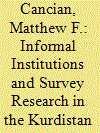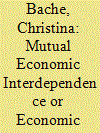|
|
|
Sort Order |
|
|
|
Items / Page
|
|
|
|
|
|
|
| Srl | Item |
| 1 |
ID:
159224


|
|
|
|
|
| Summary/Abstract |
This study sheds light on the causes of failure of economic reform in the Kurdistan Region of Iraq (KRI). It argues that the success of economic reform largely relies on the choices available for ruling authorities as well as their willingness to share power with the people and with each other. Since the birth of the Iraqi state and the KRI the interaction of uncivic traditions, rent seeking, and centralization has been the main cause hindering economic reforms that are desired to sustain development. To investigate, the study provides a comprehensive account of the failure of the region’s past and present economic policies and the sociopolitical structure that supported it.
|
|
|
|
|
|
|
|
|
|
|
|
|
|
|
|
| 2 |
ID:
167348


|
|
|
| 3 |
ID:
159235


|
|
|
|
|
| Summary/Abstract |
This article concentrates on the deepening of Ankara-Erbil relations, with a specific focus on the presence of the Turkish private sector in the Kurdistan Region of Iraq (KRI) between 2004 and 2014. During that period, the Kurdistan Regional Government (KRG) failed to implement important structural reforms to diversify the economy and ensure economic stability. The absence of a strong local private sector, independent from government-led economic activity, hindered the potential for the region to become completely self-reliant. Due to the liberal economic framework and insufficient government capacity to oversee private sector operations, foreign corporations could operate in the area without deliberately contributing to the long-term socioeconomic development of the KRI. For the viability of South Kurdistan, the KRG must require foreign corporations operating in the KRI to move beyond simple ‘do no harm’ approaches and actively engage in conflict sensitive practices including inclusive business practices, sustainable human resource management, environmental sustainability, human capital development, and social investments.
|
|
|
|
|
|
|
|
|
|
|
|
|
|
|
|
| 4 |
ID:
174085


|
|
|
|
|
| Summary/Abstract |
This article bridges the gap between referenda and foreign policy, emphasizing the role of non-state entities as (f)actors of change in the formulation of foreign policy. Using a multi-layered (rather than a normative) analysis, it examines the Kurdistan Region of Iraq as a novel, non-state case in the international relations and foreign policy analysis literature. It argues that referenda can be pursued by non-state entities, not just state actors, and analyses the parameters of the Kurdistan Regional Government’s (KRG’s) unilateral declaration and conduct of the 2017 referendum. It perceives referenda as tools for the formulation and possible facilitation of foreign policy objectives and, in particular, claims to the formation of statehood undertaken by a non-state entity. The study, therefore, pursues a multi-level analysis looking at the contributing dynamics at the domestic, regional and international levels which demonstrate the impact of referenda on foreign policy-making and examines the catalyst role of the unit level that stands out as a determining factor.
|
|
|
|
|
|
|
|
|
|
|
|
|
|
|
|
| 5 |
ID:
187614


|
|
|
|
|
| Summary/Abstract |
In many oil-rich-countries, diversification is often mentioned as a strategy for reducing the ‘curse’ of oil resources. This curse is twofold – economic and political. The economic curse is that over-dependence on oil and gas exports makes a country vulnerable to the fiscal shock of fluctuations in the price of oil and gas on the international markets which undermines the government's ability to deliver welfare programmes without running up large budget deficits by borrowing heavily to hedge against price falls. The political curse is that the oil resource invariably leads to elites monopolizing the resource for their own benefit. Advocates of economic diversification claim it could eliminate both economic and political curses. We test this claim in a case study of the Kurdistan Region of Iraq (KRI) where two political party elites control the region's oil resources, and where steps are being taken to develop the private sector to reduce the KRI's over-dependence on oil. Our finding is that while the elites approve of economic diversification as a means of reducing the region's reliance on oil, they are unwilling to allow the private sector to develop into an independent economic force which could challenge their political power. Accordingly, the political elites have taken charge of the economic diversification programme, but this has undermined its independent development because the two major political parties who share power in the Kurdistan Regional Government (KRG) have vested interests in continued imports of certain foreign products into Kurdistan and reduced imports of other foreign products. So, the parties manipulate the economic diversification policy and thereby undermine its effectiveness, in order to safeguard their own financial interests, and as a result the political curse has largely thwarted attempts to deal with the economic curse.
|
|
|
|
|
|
|
|
|
|
|
|
|
|
|
|
| 6 |
ID:
178380


|
|
|
|
|
| Summary/Abstract |
The Kurdistan Region of Iraq has a multi-party system which has been held up as a model for democratic pluralism in the whole region. The nature of Kurdistan’s political parties is strongly related to the position of Kurds in Iraq. From the mid-twentieth century, the dominant Kurdish political party in Iraq was the Kurdistan Democratic Party; in a later partisan split the Patriotic Union of Kurdistan was born. Moreover, in the last three decades other political parties have come into being, which have all influenced the characteristics of Iraqi Kurdistan’s political system. This paper’s main argument is that Iraqi Kurdistan shares many of the characteristics of its main political parties, including reliance on charismatic leadership, a focus on nationalism, and the lack of transparency. This paper analyzes the primary characteristics of the Kurdish political parties and their influence on the institutional functions of the political system in the Kurdistan Region.
|
|
|
|
|
|
|
|
|
|
|
|
|
|
|
|
|
|
|
|
|